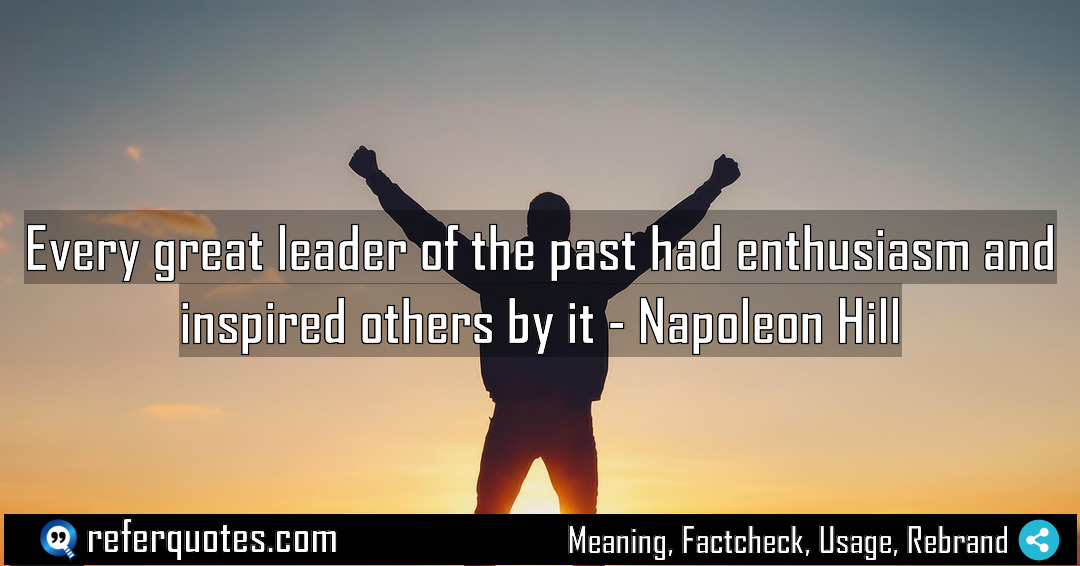
You know, when Napoleon Hill said “Every great leader of the past had enthusiasm,” he was pointing to a fundamental truth. It’s not just about having energy; it’s about that energy being contagious and becoming the very fuel for inspiring a team to achieve the impossible.
Share Image Quote:
Table of Contents
- Meaning
- Explanation
- Origin & Factcheck
- Context
- Usage Examples
- FAQ
Meaning
At its core, this quote means that enthusiasm isn’t a bonus trait for a leader—it’s the non-negotiable engine. It’s the raw, magnetic energy that transforms a plan on paper into a movement that people actually want to be a part of.
Explanation
Let me break this down from what I’ve seen. Enthusiasm is the differentiator. You can have two leaders with the exact same strategy, but the one with genuine, burning enthusiasm will always, always outperform the other. Why? Because people don’t just follow logic and orders. They follow energy. They follow belief. An enthusiastic leader doesn’t just assign tasks; they ignite a sense of purpose. They make you feel like you’re not just building a widget, you’re changing the world. And that feeling? That’s what gets people to work late, to push through obstacles, to truly care. It’s the secret sauce. It’s the thing that turns a manager into a leader.
Quote Summary
Reading Level60
Aesthetic Score80
Origin & Factcheck
This is straight from Napoleon Hill’s 1928 classic, The Law of Success, which he published in the United States. It’s a cornerstone of his philosophy. You sometimes see this sentiment floating around unattributed, or even mistakenly credited to Dale Carnegie, but the source is definitively Hill’s work from that era, born out of his study of titans like Andrew Carnegie and Henry Ford.
Attribution Summary
Author Bio
Napoleon Hill (1883–1970) wrote influential books on achievement and personal philosophy. After interviewing industrialist Andrew Carnegie, he spent years studying the habits of top performers, which led to The Law of Success and the classic Think and Grow Rich. Hill taught and lectured widely, promoting ideas like the Master Mind, definite purpose, and persistence. He collaborated with W. Clement Stone and helped launch the Napoleon Hill Foundation to preserve and extend his teachings. His work continues to shape self-help, entrepreneurship, and success literature.
| Official Website | Facebook | X| Instagram | YouTube
Where is this quotation located?
| Quotation | Every great leader of the past had enthusiasm and inspired others by it |
| Book Details | Publication Year: 1928; ISBN: 978-1-956134-21-1; Latest Edition: 2021, 1104 pages. |
| Where is it? | Lesson 7: Enthusiasm, Approximate page from 2021 edition: 320 |
Context
In the book, this idea isn’t sitting in a vacuum. Hill places enthusiasm as one of the essential qualities in his overall “Law of Success” philosophy. He frames it not as a fluffy emotion, but as a deliberately cultivated power. He argues it’s a force that can be developed and harnessed, almost like a skill, to achieve your definite chief aim. It’s presented as practical fuel, not just abstract inspiration.
Usage Examples
So how do you actually use this? Let’s get practical.
- For a Team Leader: Instead of just presenting a new quarterly goal, talk about the impact achieving it will have. Share your genuine excitement for the problem you’re solving. Your energy will set the tone for the entire team.
- For an Entrepreneur Pitching: Investors bet on jockeys, not just horses. Your belief in your vision, your passionate explanation of the “why,” is often more convincing than a perfect spreadsheet. It builds trust and makes people want to be part of your journey.
- For Anyone in a Rut: Apply it to yourself first. Fake it till you make it? There’s some truth there. Consciously bringing more positive, energetic intent to your work can change your own experience and, in turn, how others perceive and interact with you.
To whom it appeals?
Share This Quote Image & Motivate
Motivation Score82
Popularity Score79
Shareability Score80
FAQ
Question: Is enthusiasm the same as being loud or extroverted?
Answer: Not at all. This is a huge misconception. Enthusiasm is an internal conviction that radiates outward. A quiet, focused leader can be incredibly enthusiastic—it shows in their meticulous preparation, their steadfast belief in the mission, and the calm, confident energy they project.
Question: Can you learn to be enthusiastic or is it just a personality trait?
Answer: You can 100% cultivate it. It starts with connecting to your “why.” Why does your work matter? What larger purpose does it serve? When you reconnect with that core driver, the enthusiasm follows naturally. It’s a muscle you build.
Question: What if I’m just not feeling enthusiastic? Is it okay to be authentic?
Answer: Great question. Authenticity is key, but so is professionalism. You don’t have to be a cheerleader 24/7. The goal is to lead from a place of genuine commitment to the goal, not to fake an emotion. Sometimes, the most powerful enthusiasm is a quiet, determined focus on overcoming a challenge together.
Similar Quotes
You know, I’ve seen this Napoleon Hill quote about great leaders so many times, and it’s one of those rare gems that gets more true the longer you work with…
Every leader was once a learner is a simple but profound truth. It completely reframes leadership, showing it’s not about innate talent but a journey anyone can start. This mindset…
You know, I’ve seen this “good leader inspires others” quote in action for years. It’s not just theory—it’s the fundamental difference between managers who get compliance and leaders who build…
When you are able to maintain your own enthusiasm, you become a catalyst. It’s not about cheerleading; it’s about a contagious energy that literally pulls others up to a higher…
You know, I’ve seen this Simon Sinek idea in action for years now. The greatest contribution of a leader is to make others feel they’re part of something larger. It’s…
